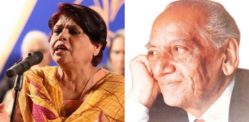"Come quietly to the rooftop, let's cry together."
Poets today tackle a wide range of ideologies, from feminism to Marxism, expressing their thoughts and feelings about love with profound depth.
They employ various techniques and styles inherent to poetry, such as ghazals, nazms, and shers, showcasing the rich diversity in their modes of expression.
While some poets adhere to a rigid structure, others embrace a more free-flowing approach, inspired by the emotion of the moment they write.
This flexibility in style underscores the dynamic nature of contemporary poetry.
Moreover, many of these poets have expanded their creative horizons to include writing short stories and conducting mushairas, demonstrating their versatility and commitment to literary arts.
Below is a list of 10 top contemporary poets of our time, featuring examples of their work and interpretations, offering a glimpse into the vibrant landscape of modern poetry.
Key Terms
Nazm
A significant aspect of Urdu poetry is typically written in rhymed verse.
It is often found in modern prose-style poems and is characterised by a controlled expression of thoughts and feelings.
Unlike traditional poetry, it doesn’t adhere to specific rules; instead, it is inspired by the writer’s life experiences and flows freely. Nazm is known for its descriptive nature.
Ghazal
Originating from Arabic poetry, the ghazal has a distinctive structure consisting of multiple rhyming couplets (AA, BA, CA, DA, EA), ranging from 5 to 15.
This form of poetry, which became a staple in Persian literature, has themes that include love, Sufism, and pain, and it shares structural similarities with the Italian sonnet.
Mushaira
An event typically held in the evenings where participants read poems in Urdu as part of a competition.
Sher
Defined as a pair of verse lines, offering a concise medium for poetic expression.
Ganga-Jamuni Tehzeeb
This term refers to the cultural fusion of Hinduism and Islam, symbolised by the confluence of the Ganga and Yamuna rivers in Prayagraj.
It represents the blending of two distinct cultures into a composite whole.
Vedas
A collection of hymns and poems composed in Sanskrit by Indo-European-speaking peoples in northwest India during the 2nd millennium BCE.
These texts are foundational to the spiritual and philosophical traditions of Hinduism.
Dohas
Known as rhyming couplets, dohas consist of a twenty-four-syllable line divided into unequal parts of thirteen (6, 4, 3) and eleven syllables (6, 4, 1).
They are employed in poetry to evoke sensual, devotional, and spiritual states of mind.
Ahmad Faraz
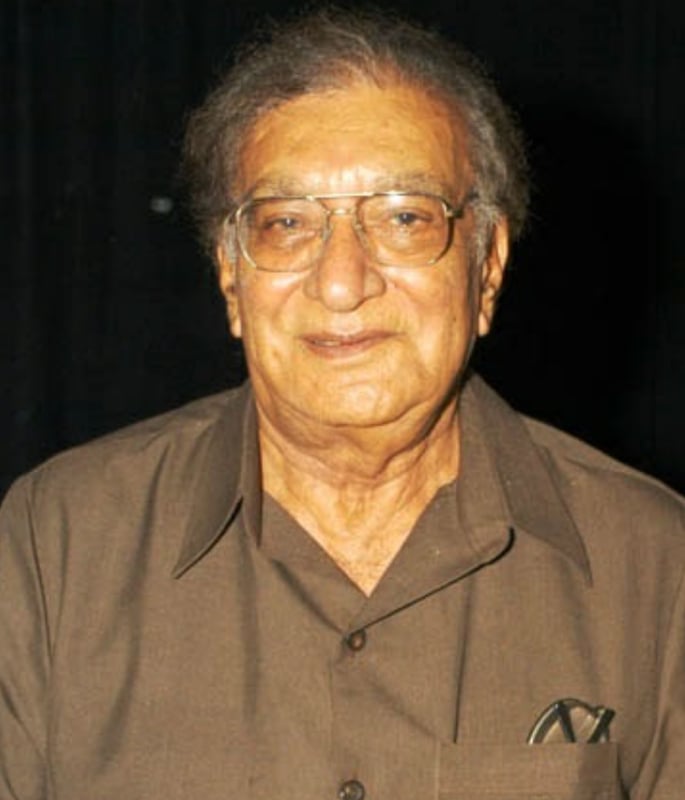 Born in 1931, Ahmad Faraz was not only a lecturer at Peshawar University but also one of the most celebrated Urdu poets in Pakistan.
Born in 1931, Ahmad Faraz was not only a lecturer at Peshawar University but also one of the most celebrated Urdu poets in Pakistan.
His roles extended beyond poetry; he was a social activist and a proficient writer.
The recurring themes in his work reflect the sentiments and philosophy of the common man, with a focus on ghazal and nazm.
Faraz’s poetry spans a wide range of subjects, including romance, love, and pain, and he has even ventured into writing about law and politics.
Some of his work has sparked controversy, leading to his imprisonment for criticizing military rule during a mushaira.
One of his poems:
The school is burning. Don’t blow. Don’t let me down.
When have you already finished it? Always don’t let me do it.
I have already drank the food you gave me.
Now I pray to you for life. I don’t do it.
There is no place like this.
Every time it becomes expensive. I don’t want to do it.
When did you meet me in love ‘Faraaz’
When did I say this, that you punished me?
This poem reflects certain characteristics inherent to the voice within it. The voice reveals an ongoing pain that deepens and strengthens throughout the poem, embodying a sense of struggle and reluctance.
The reference to food, potentially as poison, alludes to a mistrust towards the intended audience of the voice.
The poetry’s vagueness, exemplified by phrases like “there is no place,” could signify either a mental or physical state.
It may highlight the difficulty of living in the poet’s country, where “no place” symbolises the challenging environmental and social circumstances.
Furthermore, it could allude to the cost of expressing and sharing one’s ideas, which might conflict with governmental agendas and the image it seeks to maintain.
Kishwar Naheed
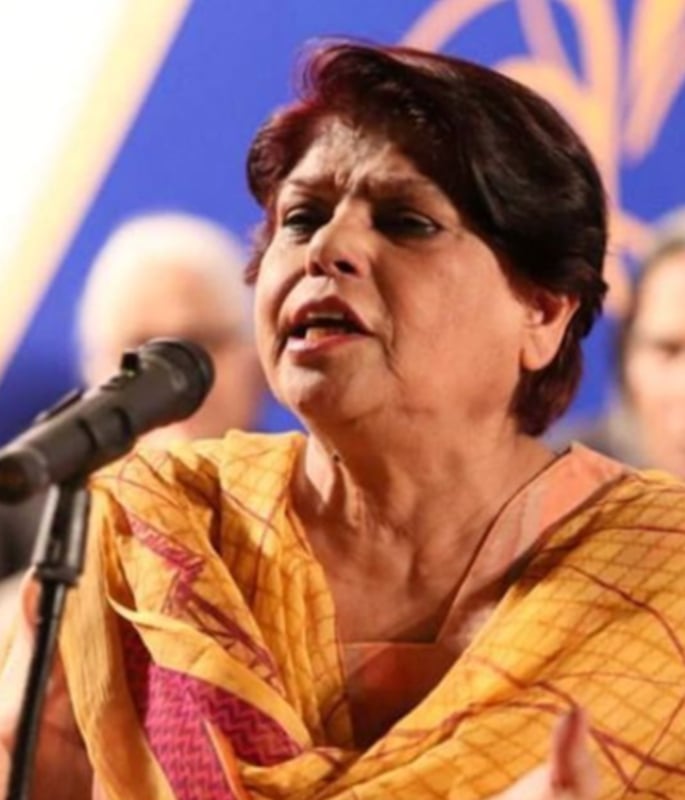 Kishwar Naheed stands as one of Pakistan’s most renowned poets, having been born in India in 1940.
Kishwar Naheed stands as one of Pakistan’s most renowned poets, having been born in India in 1940.
Throughout her thirty-year career, her work has been celebrated for its innovation, defiance, political engagement, and self-awareness.
Her poetry is distinguished by its ‘feminine’ quality, with themes that explore sexuality, social issues, and politics.
Despite the challenges of a male-dominated literary world at the time, Naheed asserted in an interview that she would “never let herself be pushed around by men or by circumstances.”
One significant hurdle was the societal norm against women’s education, which Naheed courageously overcame.
She was determined to continue her education, studying at home before earning a master’s degree in Economics from Punjab University.
Below is a poem titled ‘Talking to Myself’:
Punish me for I’ve written the significance of the dream
in my own blood written a book ridden with an obsession
Punish me for I have spent my life sanctifying the dream of the future
spent it enduring the tribulations of the night
Punish me for I have imparted knowledge and the skills of the sword to the murderer and demonstrated the power of the pen to the mind
Punish me for I have been the challenger of the crucifix of hatred
I’m the glow of torches which burn against the wind
Punish me for I have freed womanhood from the insanity of the deluded night
Punish me for if I live you might lose face
Punish for if my sons raise their hands you will meet your end
If only one sword unsheaths itself to speak you will meet your end
Punish me for I love the new life with every breath
I shall live my life and shall doubly live beyond my life
Punish me for then the sentence of your punishment will end.
This poem is both direct and provoking. The repetition mirrors the constant oppression that women face in some parts of Pakistan—intense and relentless.
In certain areas, women’s opinions are diminished, serving as a reminder that, despite becoming more influential and educated, they can still be seen as unequal to men.
The poem also carries an undertone of apology, “you might lose face,” alongside a threat. It suggests that Naheed has overcome the challenges posed by men and is moving towards a progressive future.
It embodies the idea of escape, portraying punishment as an avenue she can exploit to her advantage as she navigates through men’s perceptions of women’s rights.
Jaun Elia
 Born in Amroha, Jaun Elia received his education under the guidance of his father, nurturing an interest in history, philosophy, and religion.
Born in Amroha, Jaun Elia received his education under the guidance of his father, nurturing an interest in history, philosophy, and religion.
Kumar Vishwas remarked that Elia’s poetry resonates with pain and suffering, highlighting the depth of his emotional expression.
A Marxist poet, Elia was deeply influenced by communist ideologies.
In his book ‘Shayad,’ he critically reflected on the formation of Pakistan, stating, “If Pakistan was formed in the name of Islam, then at least the Communist Party would never have supported its demand.”
His poems are imbued with Sufi elements and spirituality, showcasing a profound connection to mystical traditions.
Additionally, his writings reflect the influence of Ganga-Jamuni, a term symbolising the confluence of Hindu and Muslim cultures in the Indian subcontinent.
Below is one of his poems, titled ‘Land of Dreams and Imaginations’:
O beauty! Here’s hoping your apparel is coloured red
Beloved! Here’s hoping your adolescence is coloured red
So self-absorbed were they that even as the walls and doors crumbled around them,
they remained wrapped up in themselves
Yesterday there was a poetry symposium at a royal palace
Everything there belonged to the poor
What have I attained by selling my conscience
Only that I am just getting by
The beauty that is the splendour of paradise for sight
Would have looked worthless wearing a pauper’s attire
Here attraction is also fostered with money
If starving, this girl would have looked ugly
History has taught only one lesson to the people
Begging for one’s rights is an insult, it is better to seize them
This duration of injustice keeps on extending
Except the opponents of tyranny who should be called
Time has taught us only one lesson
Those who rule over time should be dethroned
This poem explores themes of communist ideology, where “seize” symbolises the community’s call to overtake the government and prioritise communal ideas. Furthermore, it suggests that those in power should be “dethroned.”
The girl symbolises Elia’s romanticisation of Pakistan and illustrates how money can be a tool for evil, distorting the beauty of a woman.
The mention of consciousness highlights the freedom one gains through awareness. The more conscious and aware a person is, the more alert they become about their surroundings, leading to a liberating effect.
By addressing the country’s history, the poem expresses a sense of devotion and pride towards Pakistan. Elia acknowledges his roots with pride.
There’s an implication that beauty is devalued by poverty, as seen in “beauty… rendered worthless by wearing a pauper’s attire.”
This suggests that greater beauty is equated with greater wealth, highlighting the superficiality of the elite.
It implies that those in control may be unaware of the depth of struggle faced by the lower classes.
Shahzad Ahmad
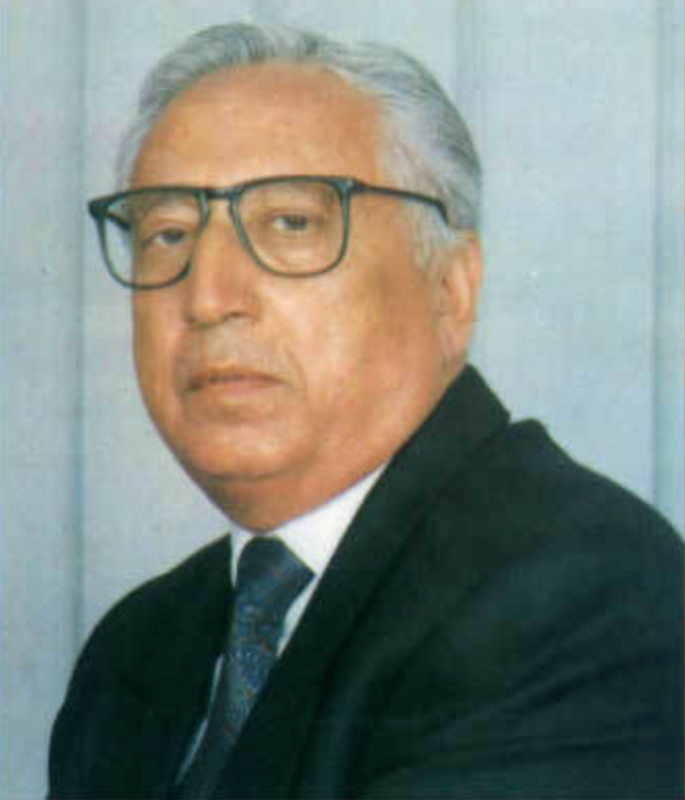 Born in 1932 in Amritsar, Shahzad Ahmad pursued a master’s degree in psychology and philosophy in Lahore.
Born in 1932 in Amritsar, Shahzad Ahmad pursued a master’s degree in psychology and philosophy in Lahore.
Over his lifetime, he has authored 30 books spanning poetry and psychology.
In the 1990s, he was honoured with the country’s highest civil award, ‘The Pride of Performance.’
Below is one of his poems:
What is your picture like?
What is happening when I look at you?
I am proud of you and I have that share again and again.
What are my stories told to my friends?
You can’t even recognise me by passing by.
What is the movement of this hand after looking for a long time?
Do not draw the lines of the destination on the canvas of your mind.
What is there in the road that can be seen from the grass?
What are you hiding from those who know you?
I have a lot of tires in the journey and the heat.
What is there to save, then what is it to destroy?
Age wise, you should get rid of your burden.
What is your gift to me?
You want to kiss the face after seeing the moon.
Why is the hair dried in the rain?
I am going to kill you because of my love.
I am ashamed of my sins. what is a caste
I don’t know much but it’s hard to talk.
Look what has come to my mind after seeing this
there is no feeling at all
What kind of noise does the sea make?
If I have any hair then I can destroy the world.
What is the storm in the cup of tea?
Your voice did not make any progress.
What makes those who wake up ‘Shahzad’?
This poem discusses a love affair with a woman that appears to be unrequited.
The storm symbolises the turmoil of love, its challenges, and its devastating effects.
However, love is likened to a cup of tea, suggesting that the worst aspects of love cannot compare to the external world’s troubles.
It also reveals his insecurities and a hint of jealousy, longing to kiss her face after she kisses the moon.
This comparison elevates the woman he loves, suggesting she is beautiful enough to kiss the moon, whereas he sees himself as merely a face in contrast.
The imagery of hair being dried in the rain illustrates the power of love and his confusion about what constitutes a good relationship.
It suggests that his understanding of love might be different from the reality he experiences.
Ahmad Hamesh
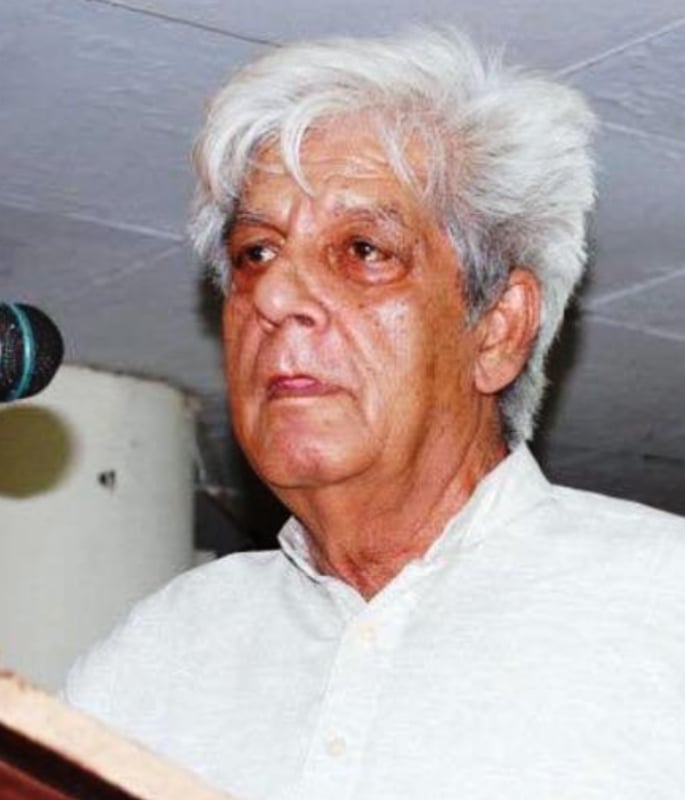 Ahmad Hamesh, born in 1940, is a distinguished writer, poet, critic, and editor.
Ahmad Hamesh, born in 1940, is a distinguished writer, poet, critic, and editor.
In his early years, he embarked on a career as a broadcaster at a radio station in Pakistan.
He is renowned for translating Sanskrit and Hindi plays for stage performances.
His first poem was published in Lahore’s Nusrat magazine in 1962, where he wrote about his bitter past.
His work is heavily influenced by the Vedas.
Below is one of his poems, titled ‘The Shay from There Has Been Shifted Here’:
What should I borrow?
The earth has become completely empty.
This is a dark night, why do you sleep?
These words make me happy.
the tree has been spread a bit
The story has been narrated.
I didn’t ask how the age passed.
Why am I getting so old?
I worship in the market, I do this but
There is a market in Harabon?
What is the need?
I have informed the stars.
He did not step in front of me.
who has been travelling with me
We are enemies with our fire.
I am going to do it first thing in the morning.
This poem depicts a traveler on his journey through life, who has become pessimistic as he perceives the Earth as “empty.”
The tree symbolises his expansion and outreach to the world. Just as the tree’s branches extend, so does his understanding and knowledge of the world he inhabits.
When he mentions the stars, it signifies guidance for sailors and travellers towards a certain destination.
However, his claim of having “told” the stars indicates a degree of control he is exerting over his journey.
This presents a contradiction between attempting to control life and allowing it to unfold naturally.
The phrase “the story has been narrated” imbues a sense of destiny, suggesting that the steps he is taking have already been predetermined, and he is merely going through the motions.
His lack of questioning the story underscores his profound faith in his God, to the extent that he does not doubt his destiny, demonstrating his trust in a higher power.
Anees Nagi
 Born in 1939, Anees Nagi was a multifaceted literary figure, known for his work as a poet, novelist, and critic. In addition to his literary pursuits, he served in government.
Born in 1939, Anees Nagi was a multifaceted literary figure, known for his work as a poet, novelist, and critic. In addition to his literary pursuits, he served in government.
He completed his master’s in Urdu, followed by a doctorate in Urdu literature at the University of Punjab.
Throughout his lifetime, he authored 79 books encompassing poems, short stories, critical essays, and biographies.
His contributions have been recognised both nationally and internationally.
Below is one of his poems, titled ‘City of Silence’:
Have the dog’s feet been kissed
where is life?
Where are you from the city?
There is one form which will remain forever.
You wonder what destination you have dreamed of?
Why are you thinking about me silently?
Every breath here is simple
there is no water in the sky
What is the origin of this faithful prayer?
Let’s go and listen.
These are the scents that are used to groom women.
No one can hide my silence here.
The back of the house’s kitchen will always be filled with water.
This poem contemplates life in the city—a city that tends to be empty and disappointing.
The speaker seeks to understand the city’s purpose, noting how the sky can reflect in the water, but not the other way around, highlighting a sense of unfairness.
The city is likened to a dog, revealing the speaker’s profound dissatisfaction with what the city represents to him.
This comparison also unveils his relationship with the city, resembling a toxic love affair, as he imagines the city thinking about him in silence.
Furthermore, the poem suggests that the city fails to recognise him as a valued member. Silence here may indicate a certain reluctance and rejection.
However, this silence could also be seen as a moment to cherish, offering a respite from the noise and making him the focus of the city’s attention.
He questions his place within the city, employing inquiries such as “why,” “where,” and “what,” to probe deeper into his urban existence.
Balraj Komal
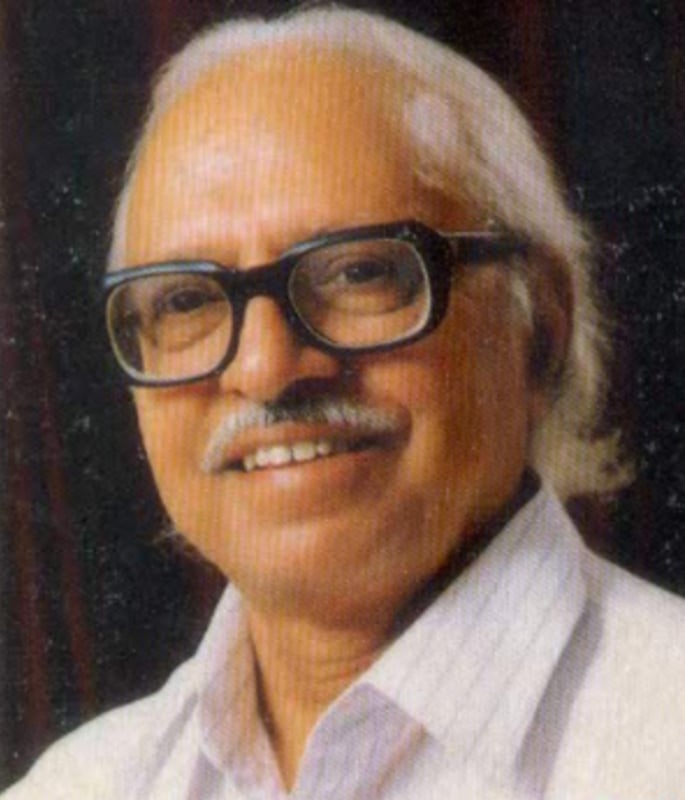 Balraj Komal is a leading poet, renowned for his warm, sensitive, and profound understanding of human behaviour.
Balraj Komal is a leading poet, renowned for his warm, sensitive, and profound understanding of human behaviour.
Born in 1928 in Pakistan, he earned a master’s degree in English Literature. He began writing at the age of nineteen, developing a deep passion for poetry.
His works often reflect on the innocence of children, exploring the nuances of love, its struggles, and its beauty.
Below is one of his poems, titled ‘The Long Dark Lake’.
In that familiar town,
Boys,
Kids from school
Were passing by noisily.
A pious, innocent girl
Was killed by her own hands
In her own home.
In the crowd of the streets,
I was there too, with my mother
And other home folks.
The little one wanted me to repeat:
A star shot from the sky
Last night
And went down
Into the long dark lake.
There is an association between death and the naivety of children.
Children are often told stories that bend the truth, both to discipline them and to shield them from life’s harsh realities.
The contrast in the characters of the children is striking: the boys are depicted as boisterous, the girl as vulnerable, and the youngest as curious, eager to “repeat” the story.
The involvement of many people lends greater significance to the event of the death.
The crowd and the town’s familiarity suggest that the neighbourhood was tight-knit, with residents well-acquainted with each other’s affairs.
Jameeluddin Aali
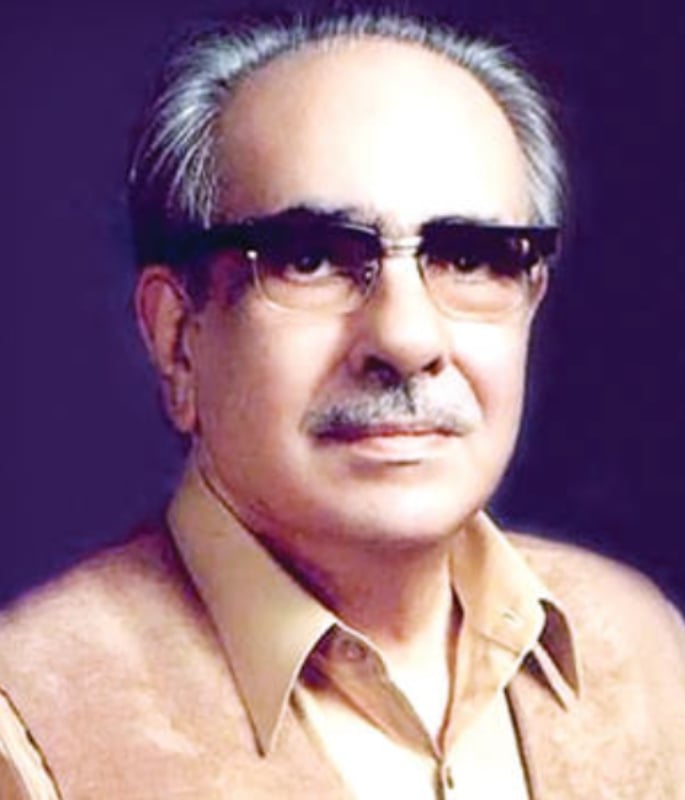 Born in 1925 in Delhi, Jameeluddin Aali delved into various facets of literature.
Born in 1925 in Delhi, Jameeluddin Aali delved into various facets of literature.
After the partition, he relocated to Pakistan and began his career in one of the central government offices.
In 1951, he ascended to the role of Income Tax Commissioner and became a key figure in Pakistan’s Writers’ Guild.
His ghazals often reflect his corporate experiences, enriching his dohas and songs with real-life insights.
A recipient of numerous literary accolades, he was awarded the President’s Medal in 1989 and the Kamal-E-Fan Award in 2006 by the Academy of Literature.
Below is one of his poems, titled ‘I Forgot the Facts by Turning Them into Fiction’.
The roots of making the truth a fairy are gone.
What is my love for you?
just this feeling of beauty to see
I have forgotten who is near you.
What is the reason behind this?
Who has forgotten how to make you exist?
I am afraid that I am destined to live there for a long time.
That traveller lost his mind in his destination.
What can we say about this wonderful hair?
That’s it. and the dust of that place is gone
My heart and soul melt with the heat of my heart.
The roots of the water of any desire are gone.
This poem delves into the intensity of love and its fluctuating nature, moving from “feeling” to “forgetting.”
The pursuit of a woman’s love is depicted as a journey that leads to “losing his mind,” symbolising both the romanticism and the uncontrollable nature of love.
It explores a troubled state of mind as he grapples with his feelings for her.
He ponders why he has forgotten, suggesting that his thoughts significantly impact his mental state.
Despite love melting his heart, he expresses dissatisfaction with love, as his desire has faded.
Fahmida Riaz
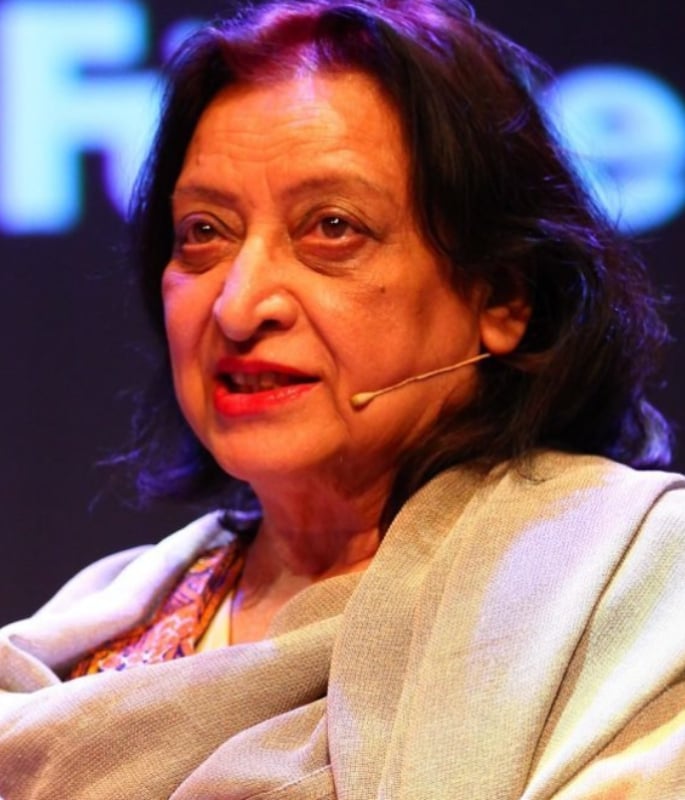 Fahmida Riaz, a poet renowned for her strong feminist and controversial works, was born in Pakistan in 1945.
Fahmida Riaz, a poet renowned for her strong feminist and controversial works, was born in Pakistan in 1945.
During the partition, she moved to Hyderabad. After her father’s death when she was just four years old, she was raised by her mother.
Upon completing her education, she worked as a newscaster for Radio Pakistan.
From a young age, she began writing. Her first publication, Aawaz, was banned due to its critical views on the ruling government and its revolutionary vision.
As a result, her family spent nearly seven years in exile.
Below is one of her poems, titled ‘I Ask for Help from the Stone’:
A man bigger than a stone
I am a human being.
there may be a clue
There is dust in my mouth.
Every moment is filled with heat.
Whosoever has melted the human being.
That kiss is not even there now.
Why are you so scared?
maybe a drop or two
I am ashamed of my body.
Now I wonder why you are attracted to someone?
The human being has passed away.
This passage alludes to the idea that spirituality intertwined with love transcends human experience, symbolised by a stone.
A stone, rigid and often associated with an absence of emotion, contrasts with the human capacity for deep feeling.
Yet, it is suggested that the soul within is the true driving force, enduring beyond the physical vessel’s decline.
The mention of “dust in the mouth” symbolises a love that lacks chemistry and interest, suggesting that the spark has long been extinguished.
Furthermore, the reference to her body and her shame raises questions about societal norms and personal feelings towards love.
It hints at an internal conflict: she recognises a desire for companionship, yet grapples with feelings that may seem indecent or unexpected. This raises the question: Is she ashamed of being in love?
Rasa Chughtai
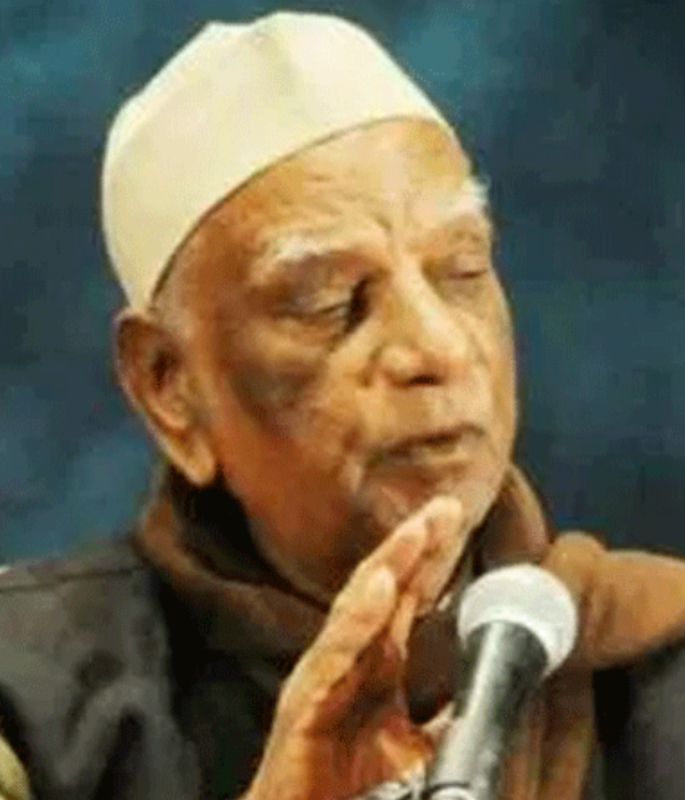 Rasa Chughtai was born in India in 1928, originally named Mirza Mohtashim Ali Baig.
Rasa Chughtai was born in India in 1928, originally named Mirza Mohtashim Ali Baig.
His work has gained significant recognition for its unique diction and expression.
He employed simple language and common vernacular in his poetry.
His most popular poems include ‘Rekta’, ‘Zanjeer Hamsaegi’, and ‘Teray Anay ka Intizar Raha’.
In 1950, he moved to Pakistan and worked in various government departments.
In 2001, he was honoured with the President’s Award by the Government of Pakistan for his literary contributions.
He occasionally chaired mushairas (poetry gatherings) in both India and Pakistan.
Below are two of his ghazals:
My heart was desperate to meet you,
Was looking forward to meeting you also.
This poem conveys the impression that the heart and mind are distinct entities. Yet, it suggests that he prioritizes thinking with his heart.
It reveals his passion and intrigue for the woman he desires.
Look, the entire moon’s sphere is stuck on the peepal tree.
Come quietly to the rooftop, let’s cry together
The moon holds an integral place in culture, signifying time—for instance, marking the opening and closing of fasts during Ramadan.
It also graces the Pakistani flag, symbolising its deep-rooted cultural significance.
When the moon is depicted as stuck on a tree, it may symbolise dismay, perhaps attributing feelings of sadness to the moon itself.
This imagery sets a melancholic tone, yet simultaneously, it fosters a cathartic connection between the poet and the audience.
Poetry serves as a powerful medium for self-expression.
Through the use of metaphors and descriptive language, poets have the ability to inspire, educate, entertain, and deeply move their readers.
It offers an opportunity to unite people and provoke change. Some poets, exercising their freedom of speech, have sparked controversy with their candidness.
Despite this, poetry remains deeply embedded in culture and continues to be a popular form of expression in the modern era.























































